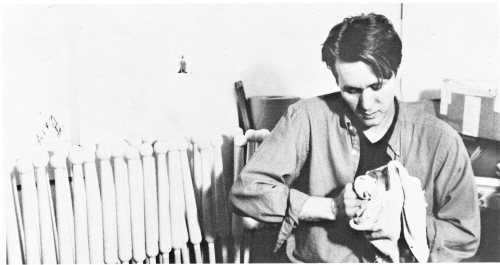|
The
industry Smith
was asked to compare and contrast the leading prop manufacturers.
First, he offered a ranking of the three full-line prop makers in
terms of gross sales: Jugglebug, Dube, then himself. While he
couldn't talk about the growth rate for other companies, he says his
business has been growing by 30 percent a year.
He
also segmented the market into two broad areas: 1. The beginner /
educational market and 2. The
experienced juggler market. He said Jugglebug effectively owns the
first market, but that Dube is starting to make inroads. Likewise, he
and Dube share the second market. He did not include Renegade Juggling
in his assessment because he said they do not offer a full range of
props.
Smith
attributes his third place standing in the market largely to his later
entry into the field. Eventually, he explained, he'll move into the
first market as well. He currently estimates that 80 percent of his
business is retail (direct mail order and convention sales) with the
remainder sold through magic stores, athletic stores, college
bookstores and the like.
Smith
readily admits his European style clubs are very similar to those of
Brian Dube. He notes that jugglers are using the two products
interchangably, and says it's simply good business sense to sell
products that can be used with those of other manufacturers.
He
sees the industry as stable, and doesn't foresee any major new
entrants into the field. He said, "The market niches are already
being served and the only way for a new manufacturer to enter is by
lowering prices." However, he claims that the profit margins are
already so low that lowering them further could only lead to
bankruptcy.
He
also said the custom prop market is becoming increasingly less important.
On the other hand, he does make specialty props. One example is the
"Holly Greeley" club, which is a standard length
European-style club that weighs 2.5 ounces less than normal. Originally
made for an Allen Jacobs, Smith credits Greeley for urging him to
continue making them. A number of five club jugglers currently use them.
He points out also that the lower weight means that these clubs will not
tolerate much abuse. Being a specialty item, their cost is $25 each.
Todd
Smith's Advice On Care and Feeding of Props
Props
get dirty. Cleaning them can be frustrating and sometimes do damage.
Here are a few of Todd Smith's inside tips on keeping your equipment
looking like new.
· Get a can of lighter fluid (Smith uses Zippo). Lighter fluid is a solvent and will remove dirt from the pores and mylar decoration of clubs and will clean carbon deposits from torches. Used on a lacrosse ball, it will both clean the ball and remove the printing, leaving you with an all-white ball.
· Use both 3/4" and 1/2" electrician's tape to retape your clubs.
· Velour beanbags should be washed by hand and immediately put in the drier. Balls filled with bird seed will sprout if they are damp for too long!
·
Silicone balls can be washed in soapy water. One of the selling points
of these balls is their incredible dirt resistance. The major exception
known to Smith is coffee, which will cause a permanent stain.
·
Rough knicks on rings can be sanded down with emery cloth.
·
Cigar boxes and devil sticks can be retaped. Contact your manufacturer
to buy a roll for that purpose.
|
